Management Practicum: Learning Portfolio Assessment Report - Part A
VerifiedAdded on 2020/02/19
|20
|5915
|316
Report
AI Summary
This management practicum report, submitted by a student, provides a detailed analysis of their experiences and learning within the hospitality industry. The report begins by exploring the student's journey and the importance of employability requirements, emphasizing the significance of soft skills and communication in securing a position as an F&B attendant at Intercontinental Sydney. It then delves into the induction process at the hotel, highlighting key steps like welcome activities, confirmation of job decisions, and interactions with the HR department, while also suggesting areas for improvement such as departmental tours and enhanced safety procedures. Finally, the report evaluates the training programs at Intercontinental Sydney, outlining the three-step process of needs analysis, development of training manuals, and actual delivery of the training program, showcasing the hotel's commitment to employee development and its impact on overall performance. The report offers valuable insights into the practical aspects of management and training within a hospitality setting.
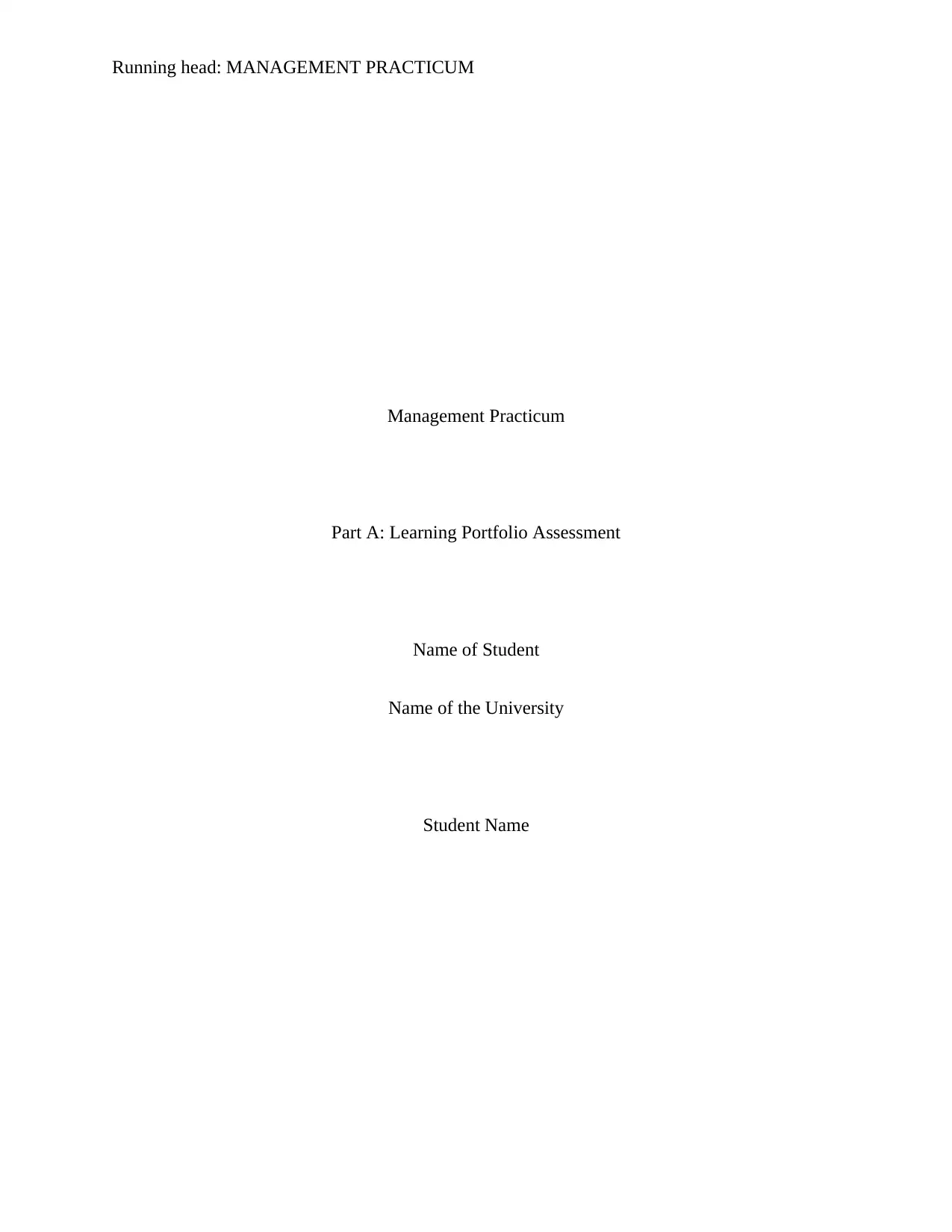
Running head: MANAGEMENT PRACTICUM
Management Practicum
Part A: Learning Portfolio Assessment
Name of Student
Name of the University
Student Name
Management Practicum
Part A: Learning Portfolio Assessment
Name of Student
Name of the University
Student Name
Paraphrase This Document
Need a fresh take? Get an instant paraphrase of this document with our AI Paraphraser
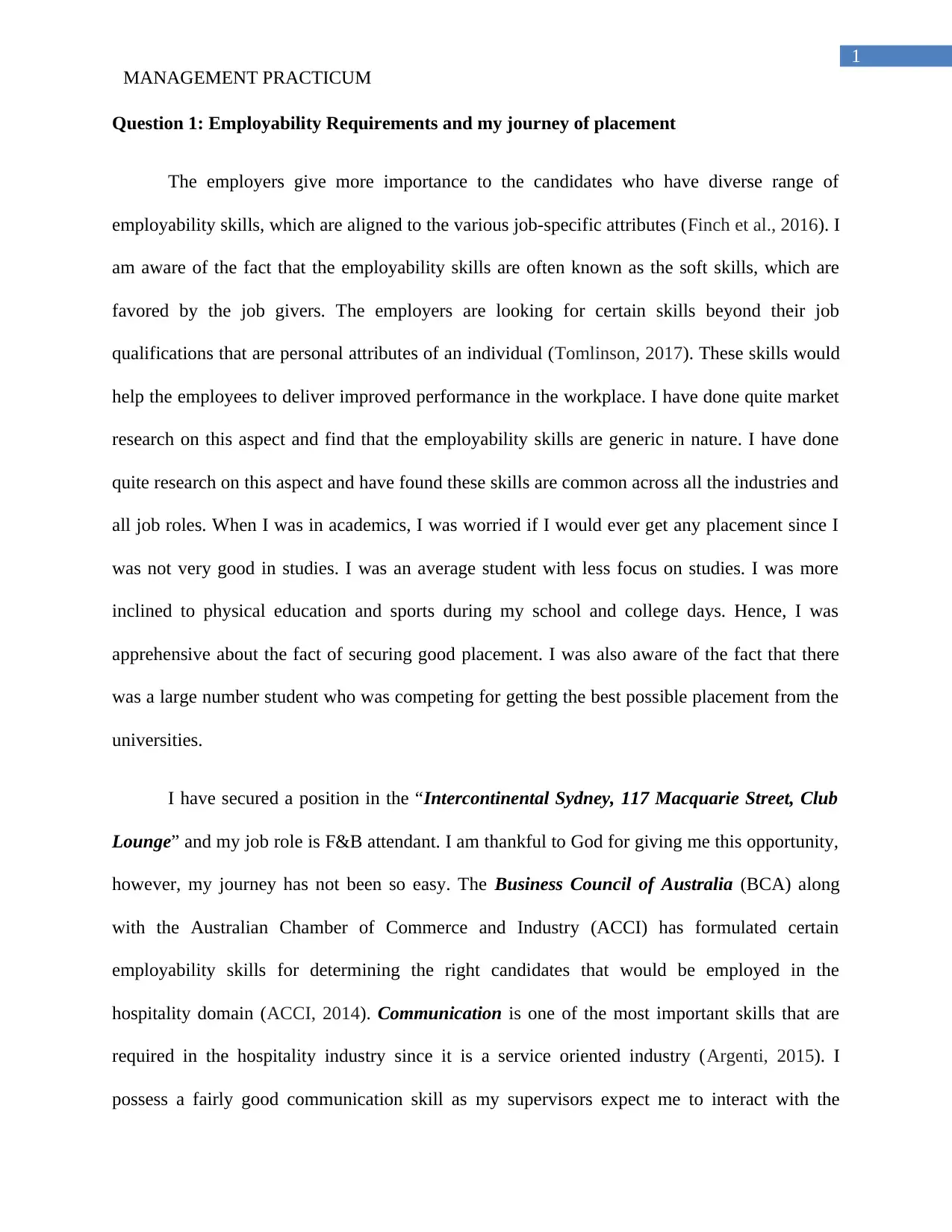
1
MANAGEMENT PRACTICUM
Question 1: Employability Requirements and my journey of placement
The employers give more importance to the candidates who have diverse range of
employability skills, which are aligned to the various job-specific attributes (Finch et al., 2016). I
am aware of the fact that the employability skills are often known as the soft skills, which are
favored by the job givers. The employers are looking for certain skills beyond their job
qualifications that are personal attributes of an individual (Tomlinson, 2017). These skills would
help the employees to deliver improved performance in the workplace. I have done quite market
research on this aspect and find that the employability skills are generic in nature. I have done
quite research on this aspect and have found these skills are common across all the industries and
all job roles. When I was in academics, I was worried if I would ever get any placement since I
was not very good in studies. I was an average student with less focus on studies. I was more
inclined to physical education and sports during my school and college days. Hence, I was
apprehensive about the fact of securing good placement. I was also aware of the fact that there
was a large number student who was competing for getting the best possible placement from the
universities.
I have secured a position in the “Intercontinental Sydney, 117 Macquarie Street, Club
Lounge” and my job role is F&B attendant. I am thankful to God for giving me this opportunity,
however, my journey has not been so easy. The Business Council of Australia (BCA) along
with the Australian Chamber of Commerce and Industry (ACCI) has formulated certain
employability skills for determining the right candidates that would be employed in the
hospitality domain (ACCI, 2014). Communication is one of the most important skills that are
required in the hospitality industry since it is a service oriented industry (Argenti, 2015). I
possess a fairly good communication skill as my supervisors expect me to interact with the
MANAGEMENT PRACTICUM
Question 1: Employability Requirements and my journey of placement
The employers give more importance to the candidates who have diverse range of
employability skills, which are aligned to the various job-specific attributes (Finch et al., 2016). I
am aware of the fact that the employability skills are often known as the soft skills, which are
favored by the job givers. The employers are looking for certain skills beyond their job
qualifications that are personal attributes of an individual (Tomlinson, 2017). These skills would
help the employees to deliver improved performance in the workplace. I have done quite market
research on this aspect and find that the employability skills are generic in nature. I have done
quite research on this aspect and have found these skills are common across all the industries and
all job roles. When I was in academics, I was worried if I would ever get any placement since I
was not very good in studies. I was an average student with less focus on studies. I was more
inclined to physical education and sports during my school and college days. Hence, I was
apprehensive about the fact of securing good placement. I was also aware of the fact that there
was a large number student who was competing for getting the best possible placement from the
universities.
I have secured a position in the “Intercontinental Sydney, 117 Macquarie Street, Club
Lounge” and my job role is F&B attendant. I am thankful to God for giving me this opportunity,
however, my journey has not been so easy. The Business Council of Australia (BCA) along
with the Australian Chamber of Commerce and Industry (ACCI) has formulated certain
employability skills for determining the right candidates that would be employed in the
hospitality domain (ACCI, 2014). Communication is one of the most important skills that are
required in the hospitality industry since it is a service oriented industry (Argenti, 2015). I
possess a fairly good communication skill as my supervisors expect me to interact with the
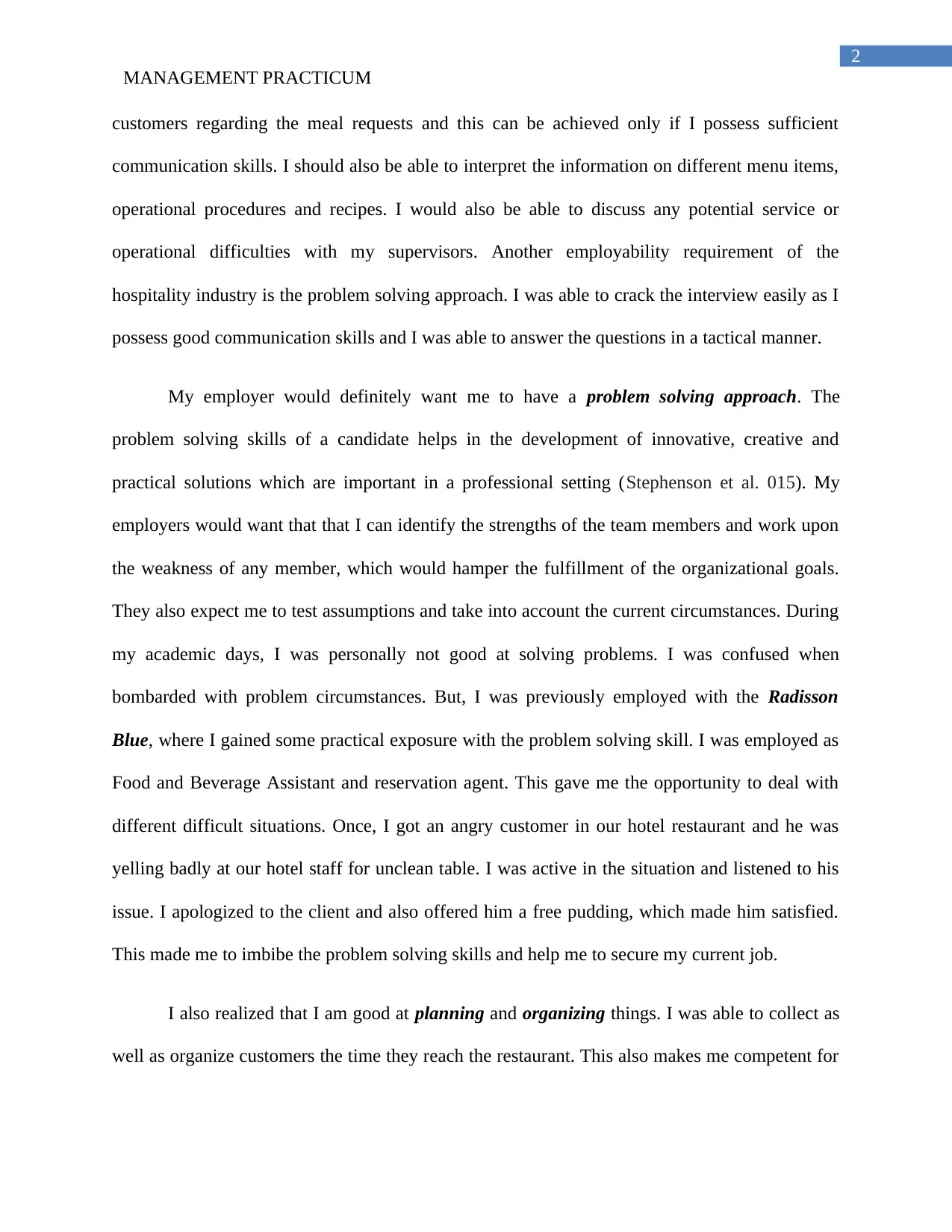
2
MANAGEMENT PRACTICUM
customers regarding the meal requests and this can be achieved only if I possess sufficient
communication skills. I should also be able to interpret the information on different menu items,
operational procedures and recipes. I would also be able to discuss any potential service or
operational difficulties with my supervisors. Another employability requirement of the
hospitality industry is the problem solving approach. I was able to crack the interview easily as I
possess good communication skills and I was able to answer the questions in a tactical manner.
My employer would definitely want me to have a problem solving approach. The
problem solving skills of a candidate helps in the development of innovative, creative and
practical solutions which are important in a professional setting (Stephenson et al. 015). My
employers would want that that I can identify the strengths of the team members and work upon
the weakness of any member, which would hamper the fulfillment of the organizational goals.
They also expect me to test assumptions and take into account the current circumstances. During
my academic days, I was personally not good at solving problems. I was confused when
bombarded with problem circumstances. But, I was previously employed with the Radisson
Blue, where I gained some practical exposure with the problem solving skill. I was employed as
Food and Beverage Assistant and reservation agent. This gave me the opportunity to deal with
different difficult situations. Once, I got an angry customer in our hotel restaurant and he was
yelling badly at our hotel staff for unclean table. I was active in the situation and listened to his
issue. I apologized to the client and also offered him a free pudding, which made him satisfied.
This made me to imbibe the problem solving skills and help me to secure my current job.
I also realized that I am good at planning and organizing things. I was able to collect as
well as organize customers the time they reach the restaurant. This also makes me competent for
MANAGEMENT PRACTICUM
customers regarding the meal requests and this can be achieved only if I possess sufficient
communication skills. I should also be able to interpret the information on different menu items,
operational procedures and recipes. I would also be able to discuss any potential service or
operational difficulties with my supervisors. Another employability requirement of the
hospitality industry is the problem solving approach. I was able to crack the interview easily as I
possess good communication skills and I was able to answer the questions in a tactical manner.
My employer would definitely want me to have a problem solving approach. The
problem solving skills of a candidate helps in the development of innovative, creative and
practical solutions which are important in a professional setting (Stephenson et al. 015). My
employers would want that that I can identify the strengths of the team members and work upon
the weakness of any member, which would hamper the fulfillment of the organizational goals.
They also expect me to test assumptions and take into account the current circumstances. During
my academic days, I was personally not good at solving problems. I was confused when
bombarded with problem circumstances. But, I was previously employed with the Radisson
Blue, where I gained some practical exposure with the problem solving skill. I was employed as
Food and Beverage Assistant and reservation agent. This gave me the opportunity to deal with
different difficult situations. Once, I got an angry customer in our hotel restaurant and he was
yelling badly at our hotel staff for unclean table. I was active in the situation and listened to his
issue. I apologized to the client and also offered him a free pudding, which made him satisfied.
This made me to imbibe the problem solving skills and help me to secure my current job.
I also realized that I am good at planning and organizing things. I was able to collect as
well as organize customers the time they reach the restaurant. This also makes me competent for
⊘ This is a preview!⊘
Do you want full access?
Subscribe today to unlock all pages.

Trusted by 1+ million students worldwide
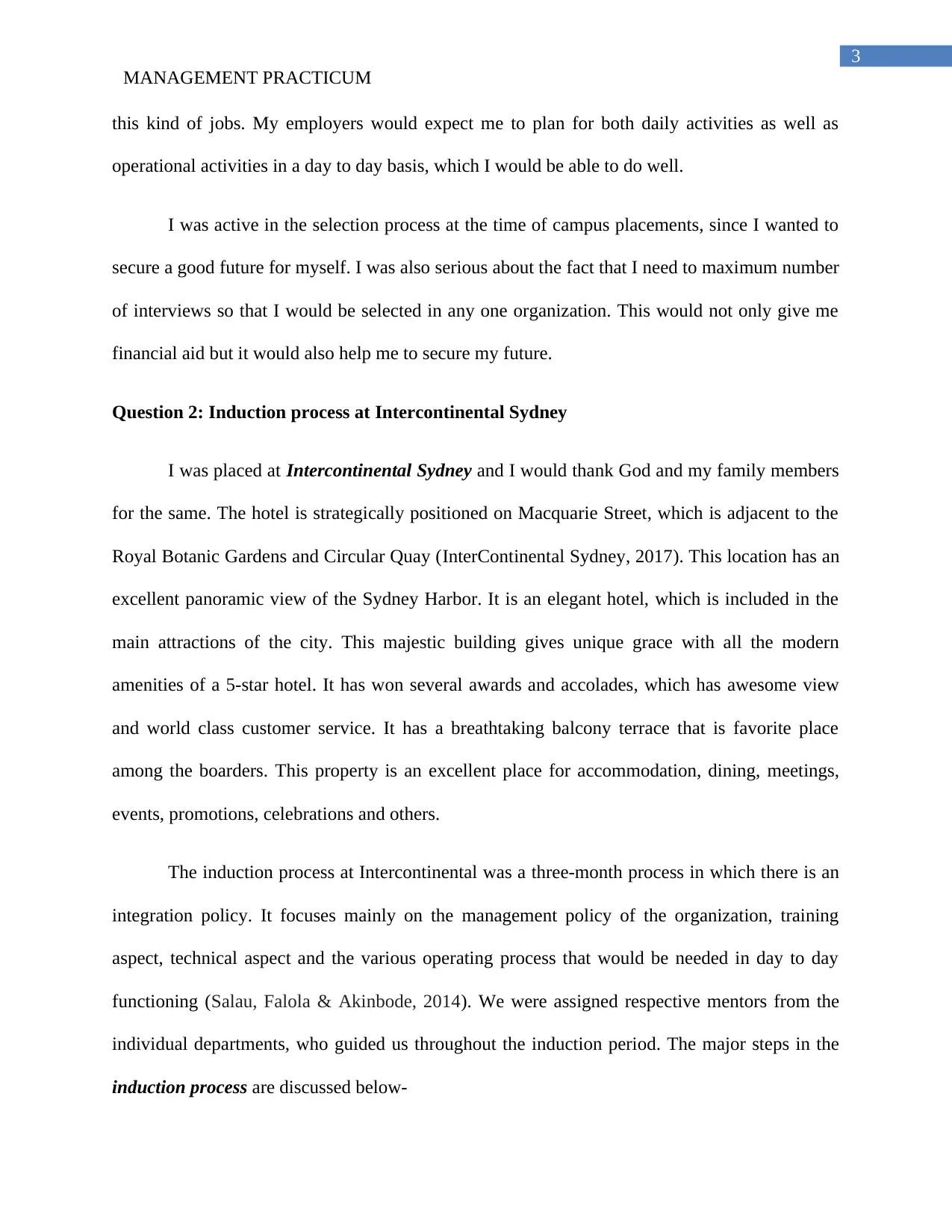
3
MANAGEMENT PRACTICUM
this kind of jobs. My employers would expect me to plan for both daily activities as well as
operational activities in a day to day basis, which I would be able to do well.
I was active in the selection process at the time of campus placements, since I wanted to
secure a good future for myself. I was also serious about the fact that I need to maximum number
of interviews so that I would be selected in any one organization. This would not only give me
financial aid but it would also help me to secure my future.
Question 2: Induction process at Intercontinental Sydney
I was placed at Intercontinental Sydney and I would thank God and my family members
for the same. The hotel is strategically positioned on Macquarie Street, which is adjacent to the
Royal Botanic Gardens and Circular Quay (InterContinental Sydney, 2017). This location has an
excellent panoramic view of the Sydney Harbor. It is an elegant hotel, which is included in the
main attractions of the city. This majestic building gives unique grace with all the modern
amenities of a 5-star hotel. It has won several awards and accolades, which has awesome view
and world class customer service. It has a breathtaking balcony terrace that is favorite place
among the boarders. This property is an excellent place for accommodation, dining, meetings,
events, promotions, celebrations and others.
The induction process at Intercontinental was a three-month process in which there is an
integration policy. It focuses mainly on the management policy of the organization, training
aspect, technical aspect and the various operating process that would be needed in day to day
functioning (Salau, Falola & Akinbode, 2014). We were assigned respective mentors from the
individual departments, who guided us throughout the induction period. The major steps in the
induction process are discussed below-
MANAGEMENT PRACTICUM
this kind of jobs. My employers would expect me to plan for both daily activities as well as
operational activities in a day to day basis, which I would be able to do well.
I was active in the selection process at the time of campus placements, since I wanted to
secure a good future for myself. I was also serious about the fact that I need to maximum number
of interviews so that I would be selected in any one organization. This would not only give me
financial aid but it would also help me to secure my future.
Question 2: Induction process at Intercontinental Sydney
I was placed at Intercontinental Sydney and I would thank God and my family members
for the same. The hotel is strategically positioned on Macquarie Street, which is adjacent to the
Royal Botanic Gardens and Circular Quay (InterContinental Sydney, 2017). This location has an
excellent panoramic view of the Sydney Harbor. It is an elegant hotel, which is included in the
main attractions of the city. This majestic building gives unique grace with all the modern
amenities of a 5-star hotel. It has won several awards and accolades, which has awesome view
and world class customer service. It has a breathtaking balcony terrace that is favorite place
among the boarders. This property is an excellent place for accommodation, dining, meetings,
events, promotions, celebrations and others.
The induction process at Intercontinental was a three-month process in which there is an
integration policy. It focuses mainly on the management policy of the organization, training
aspect, technical aspect and the various operating process that would be needed in day to day
functioning (Salau, Falola & Akinbode, 2014). We were assigned respective mentors from the
individual departments, who guided us throughout the induction period. The major steps in the
induction process are discussed below-
Paraphrase This Document
Need a fresh take? Get an instant paraphrase of this document with our AI Paraphraser
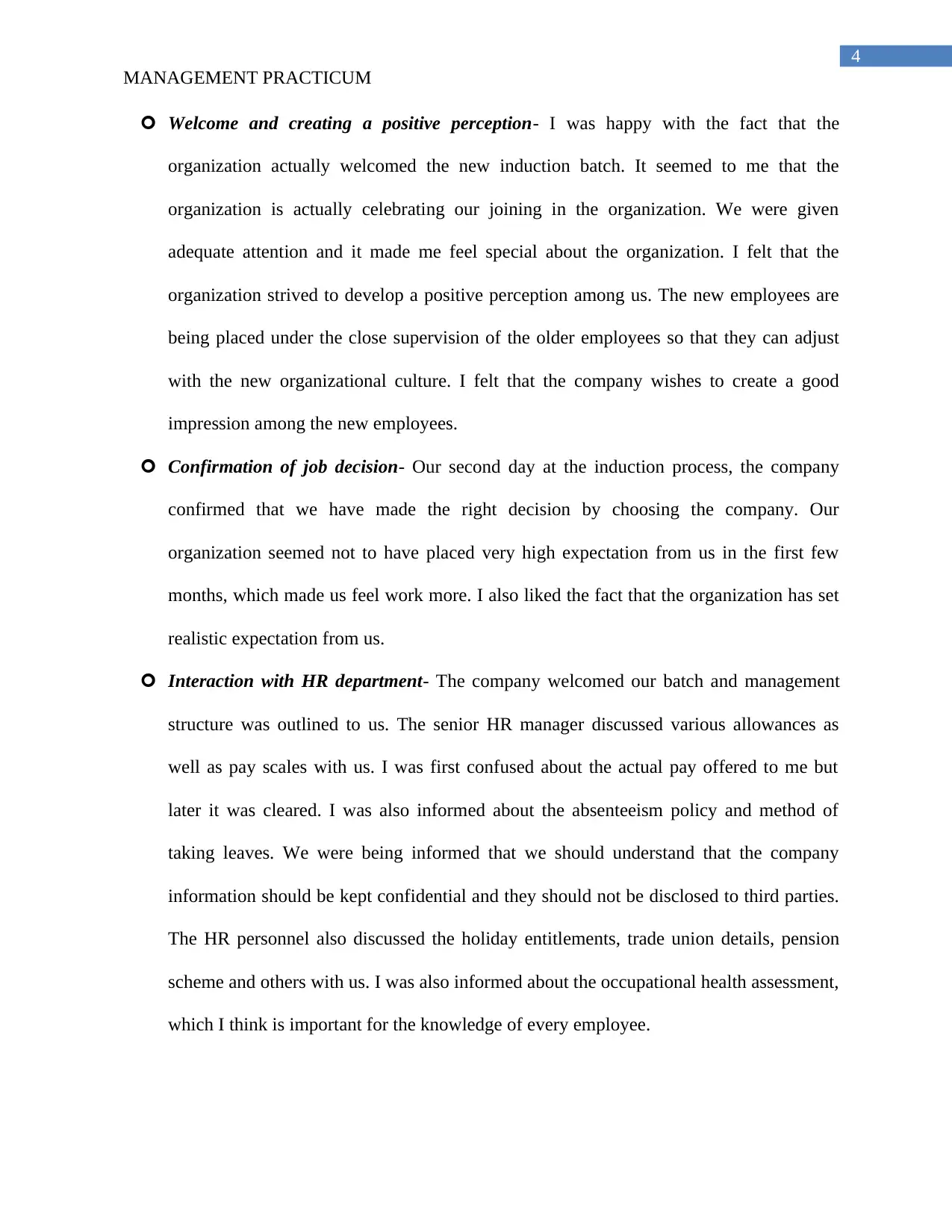
4
MANAGEMENT PRACTICUM
Welcome and creating a positive perception- I was happy with the fact that the
organization actually welcomed the new induction batch. It seemed to me that the
organization is actually celebrating our joining in the organization. We were given
adequate attention and it made me feel special about the organization. I felt that the
organization strived to develop a positive perception among us. The new employees are
being placed under the close supervision of the older employees so that they can adjust
with the new organizational culture. I felt that the company wishes to create a good
impression among the new employees.
Confirmation of job decision- Our second day at the induction process, the company
confirmed that we have made the right decision by choosing the company. Our
organization seemed not to have placed very high expectation from us in the first few
months, which made us feel work more. I also liked the fact that the organization has set
realistic expectation from us.
Interaction with HR department- The company welcomed our batch and management
structure was outlined to us. The senior HR manager discussed various allowances as
well as pay scales with us. I was first confused about the actual pay offered to me but
later it was cleared. I was also informed about the absenteeism policy and method of
taking leaves. We were being informed that we should understand that the company
information should be kept confidential and they should not be disclosed to third parties.
The HR personnel also discussed the holiday entitlements, trade union details, pension
scheme and others with us. I was also informed about the occupational health assessment,
which I think is important for the knowledge of every employee.
MANAGEMENT PRACTICUM
Welcome and creating a positive perception- I was happy with the fact that the
organization actually welcomed the new induction batch. It seemed to me that the
organization is actually celebrating our joining in the organization. We were given
adequate attention and it made me feel special about the organization. I felt that the
organization strived to develop a positive perception among us. The new employees are
being placed under the close supervision of the older employees so that they can adjust
with the new organizational culture. I felt that the company wishes to create a good
impression among the new employees.
Confirmation of job decision- Our second day at the induction process, the company
confirmed that we have made the right decision by choosing the company. Our
organization seemed not to have placed very high expectation from us in the first few
months, which made us feel work more. I also liked the fact that the organization has set
realistic expectation from us.
Interaction with HR department- The company welcomed our batch and management
structure was outlined to us. The senior HR manager discussed various allowances as
well as pay scales with us. I was first confused about the actual pay offered to me but
later it was cleared. I was also informed about the absenteeism policy and method of
taking leaves. We were being informed that we should understand that the company
information should be kept confidential and they should not be disclosed to third parties.
The HR personnel also discussed the holiday entitlements, trade union details, pension
scheme and others with us. I was also informed about the occupational health assessment,
which I think is important for the knowledge of every employee.
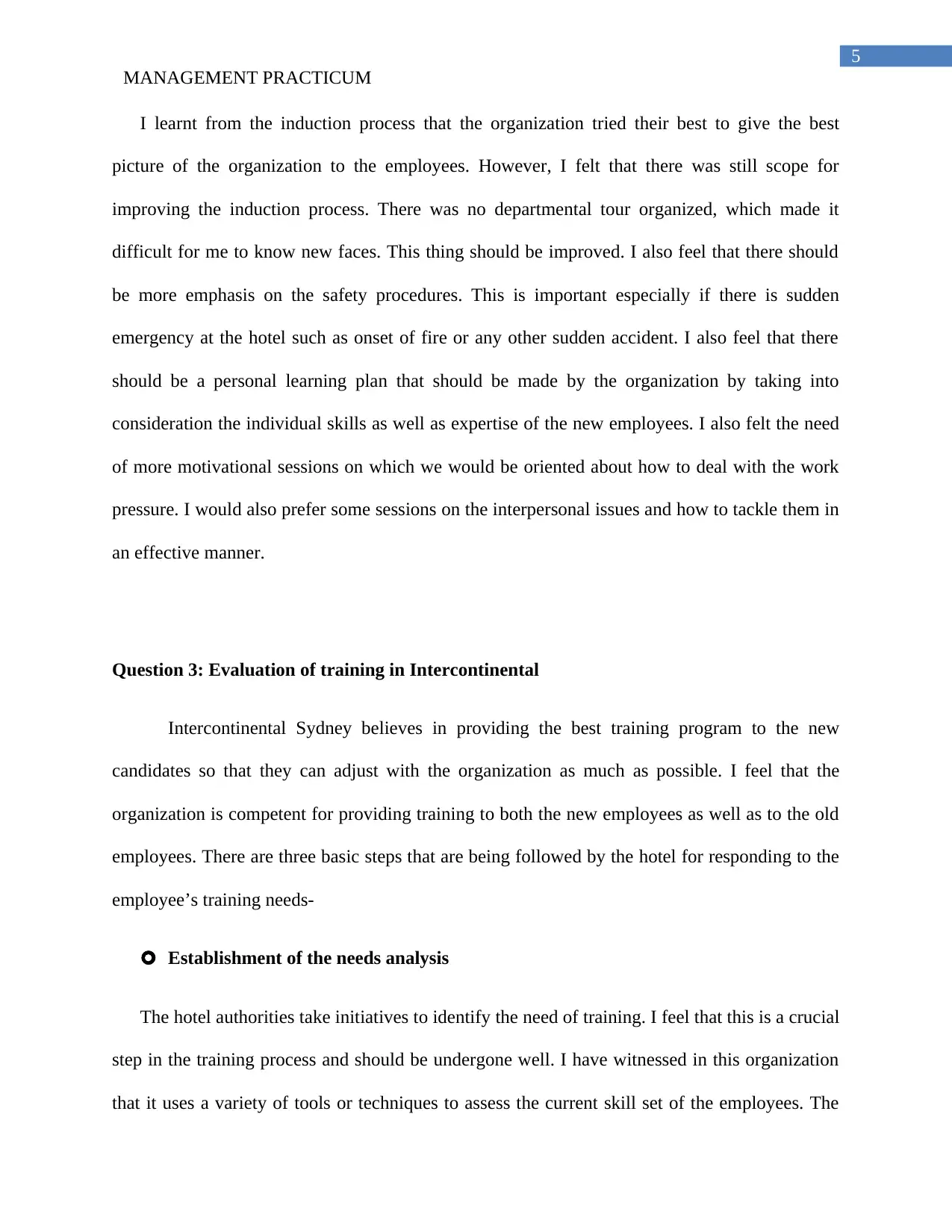
5
MANAGEMENT PRACTICUM
I learnt from the induction process that the organization tried their best to give the best
picture of the organization to the employees. However, I felt that there was still scope for
improving the induction process. There was no departmental tour organized, which made it
difficult for me to know new faces. This thing should be improved. I also feel that there should
be more emphasis on the safety procedures. This is important especially if there is sudden
emergency at the hotel such as onset of fire or any other sudden accident. I also feel that there
should be a personal learning plan that should be made by the organization by taking into
consideration the individual skills as well as expertise of the new employees. I also felt the need
of more motivational sessions on which we would be oriented about how to deal with the work
pressure. I would also prefer some sessions on the interpersonal issues and how to tackle them in
an effective manner.
Question 3: Evaluation of training in Intercontinental
Intercontinental Sydney believes in providing the best training program to the new
candidates so that they can adjust with the organization as much as possible. I feel that the
organization is competent for providing training to both the new employees as well as to the old
employees. There are three basic steps that are being followed by the hotel for responding to the
employee’s training needs-
Establishment of the needs analysis
The hotel authorities take initiatives to identify the need of training. I feel that this is a crucial
step in the training process and should be undergone well. I have witnessed in this organization
that it uses a variety of tools or techniques to assess the current skill set of the employees. The
MANAGEMENT PRACTICUM
I learnt from the induction process that the organization tried their best to give the best
picture of the organization to the employees. However, I felt that there was still scope for
improving the induction process. There was no departmental tour organized, which made it
difficult for me to know new faces. This thing should be improved. I also feel that there should
be more emphasis on the safety procedures. This is important especially if there is sudden
emergency at the hotel such as onset of fire or any other sudden accident. I also feel that there
should be a personal learning plan that should be made by the organization by taking into
consideration the individual skills as well as expertise of the new employees. I also felt the need
of more motivational sessions on which we would be oriented about how to deal with the work
pressure. I would also prefer some sessions on the interpersonal issues and how to tackle them in
an effective manner.
Question 3: Evaluation of training in Intercontinental
Intercontinental Sydney believes in providing the best training program to the new
candidates so that they can adjust with the organization as much as possible. I feel that the
organization is competent for providing training to both the new employees as well as to the old
employees. There are three basic steps that are being followed by the hotel for responding to the
employee’s training needs-
Establishment of the needs analysis
The hotel authorities take initiatives to identify the need of training. I feel that this is a crucial
step in the training process and should be undergone well. I have witnessed in this organization
that it uses a variety of tools or techniques to assess the current skill set of the employees. The
⊘ This is a preview!⊘
Do you want full access?
Subscribe today to unlock all pages.

Trusted by 1+ million students worldwide
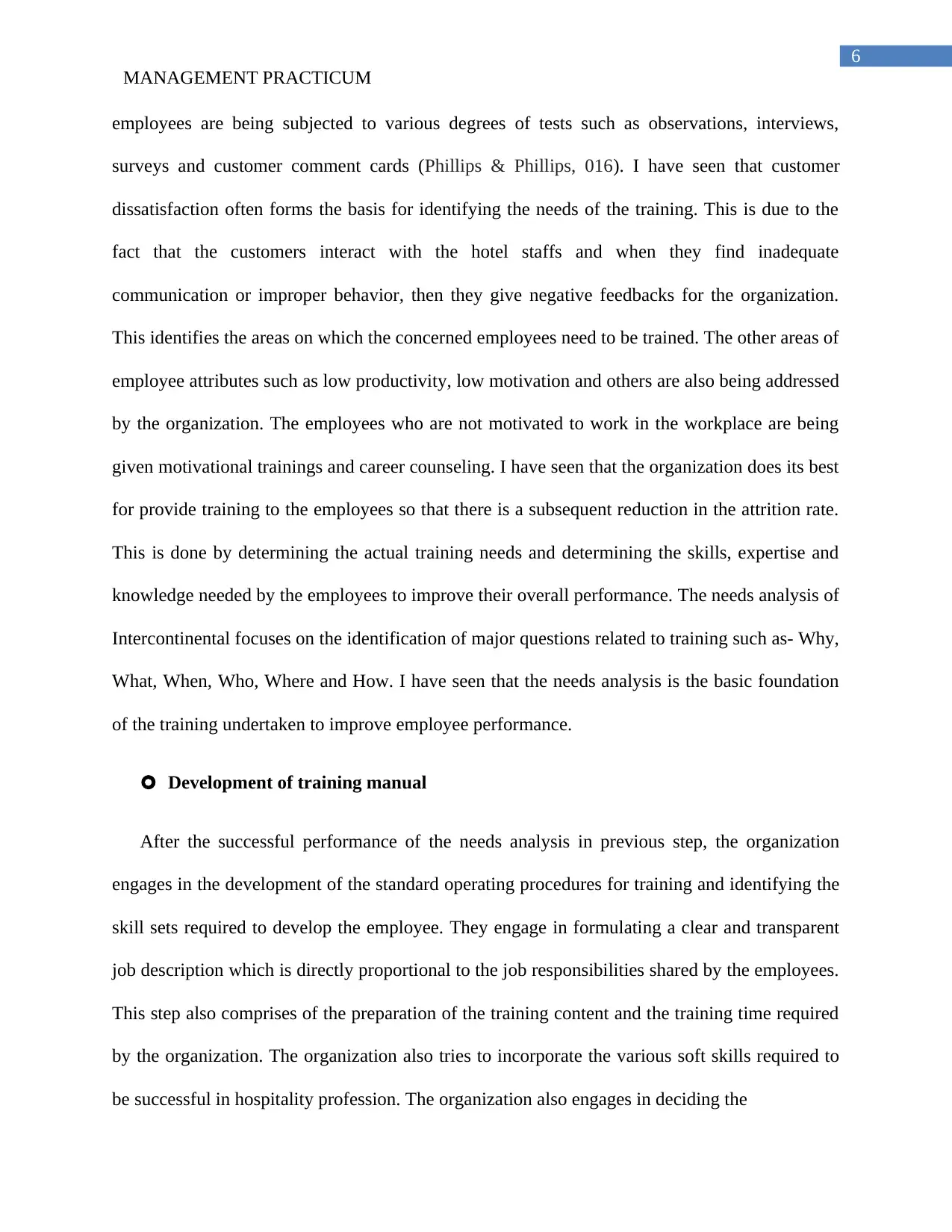
6
MANAGEMENT PRACTICUM
employees are being subjected to various degrees of tests such as observations, interviews,
surveys and customer comment cards (Phillips & Phillips, 016). I have seen that customer
dissatisfaction often forms the basis for identifying the needs of the training. This is due to the
fact that the customers interact with the hotel staffs and when they find inadequate
communication or improper behavior, then they give negative feedbacks for the organization.
This identifies the areas on which the concerned employees need to be trained. The other areas of
employee attributes such as low productivity, low motivation and others are also being addressed
by the organization. The employees who are not motivated to work in the workplace are being
given motivational trainings and career counseling. I have seen that the organization does its best
for provide training to the employees so that there is a subsequent reduction in the attrition rate.
This is done by determining the actual training needs and determining the skills, expertise and
knowledge needed by the employees to improve their overall performance. The needs analysis of
Intercontinental focuses on the identification of major questions related to training such as- Why,
What, When, Who, Where and How. I have seen that the needs analysis is the basic foundation
of the training undertaken to improve employee performance.
Development of training manual
After the successful performance of the needs analysis in previous step, the organization
engages in the development of the standard operating procedures for training and identifying the
skill sets required to develop the employee. They engage in formulating a clear and transparent
job description which is directly proportional to the job responsibilities shared by the employees.
This step also comprises of the preparation of the training content and the training time required
by the organization. The organization also tries to incorporate the various soft skills required to
be successful in hospitality profession. The organization also engages in deciding the
MANAGEMENT PRACTICUM
employees are being subjected to various degrees of tests such as observations, interviews,
surveys and customer comment cards (Phillips & Phillips, 016). I have seen that customer
dissatisfaction often forms the basis for identifying the needs of the training. This is due to the
fact that the customers interact with the hotel staffs and when they find inadequate
communication or improper behavior, then they give negative feedbacks for the organization.
This identifies the areas on which the concerned employees need to be trained. The other areas of
employee attributes such as low productivity, low motivation and others are also being addressed
by the organization. The employees who are not motivated to work in the workplace are being
given motivational trainings and career counseling. I have seen that the organization does its best
for provide training to the employees so that there is a subsequent reduction in the attrition rate.
This is done by determining the actual training needs and determining the skills, expertise and
knowledge needed by the employees to improve their overall performance. The needs analysis of
Intercontinental focuses on the identification of major questions related to training such as- Why,
What, When, Who, Where and How. I have seen that the needs analysis is the basic foundation
of the training undertaken to improve employee performance.
Development of training manual
After the successful performance of the needs analysis in previous step, the organization
engages in the development of the standard operating procedures for training and identifying the
skill sets required to develop the employee. They engage in formulating a clear and transparent
job description which is directly proportional to the job responsibilities shared by the employees.
This step also comprises of the preparation of the training content and the training time required
by the organization. The organization also tries to incorporate the various soft skills required to
be successful in hospitality profession. The organization also engages in deciding the
Paraphrase This Document
Need a fresh take? Get an instant paraphrase of this document with our AI Paraphraser
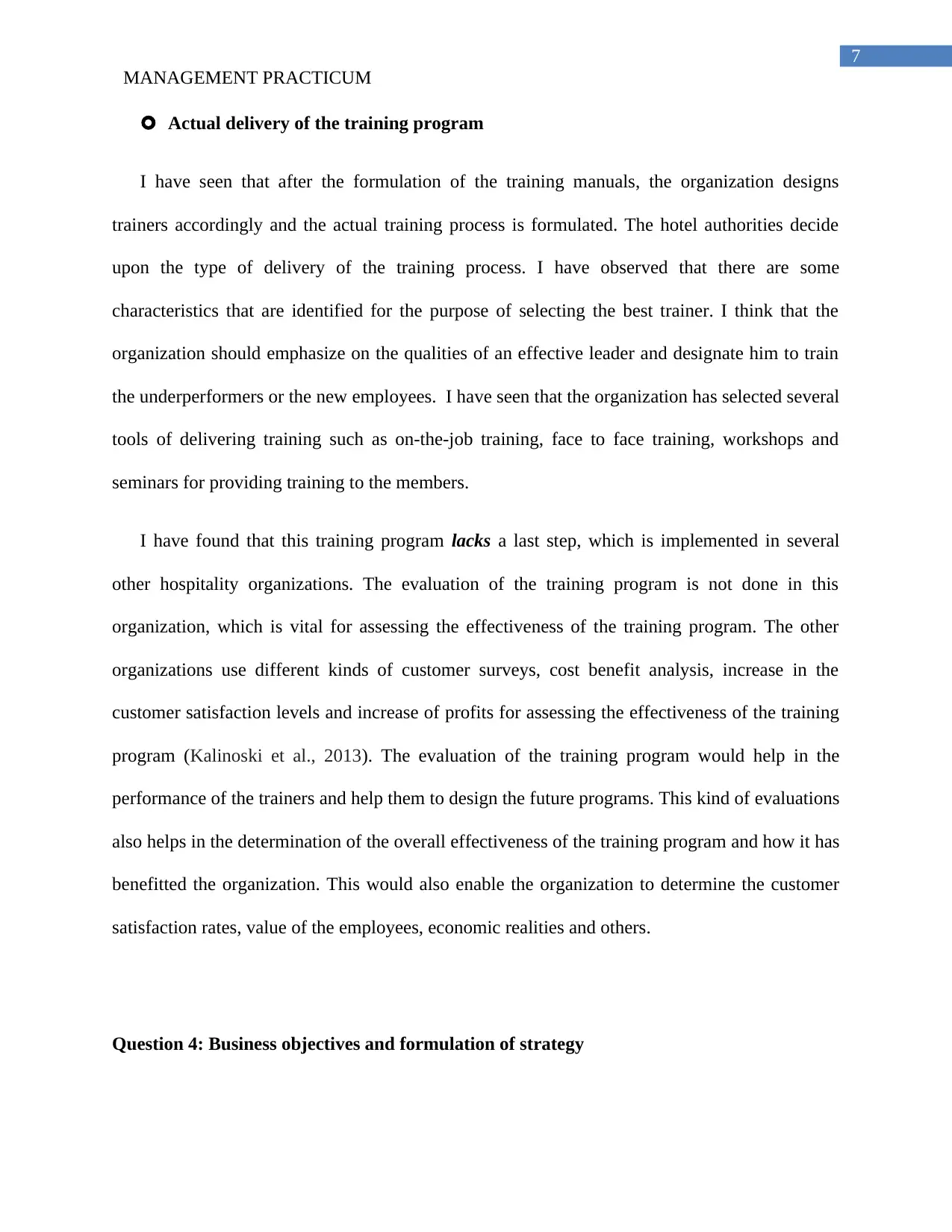
7
MANAGEMENT PRACTICUM
Actual delivery of the training program
I have seen that after the formulation of the training manuals, the organization designs
trainers accordingly and the actual training process is formulated. The hotel authorities decide
upon the type of delivery of the training process. I have observed that there are some
characteristics that are identified for the purpose of selecting the best trainer. I think that the
organization should emphasize on the qualities of an effective leader and designate him to train
the underperformers or the new employees. I have seen that the organization has selected several
tools of delivering training such as on-the-job training, face to face training, workshops and
seminars for providing training to the members.
I have found that this training program lacks a last step, which is implemented in several
other hospitality organizations. The evaluation of the training program is not done in this
organization, which is vital for assessing the effectiveness of the training program. The other
organizations use different kinds of customer surveys, cost benefit analysis, increase in the
customer satisfaction levels and increase of profits for assessing the effectiveness of the training
program (Kalinoski et al., 2013). The evaluation of the training program would help in the
performance of the trainers and help them to design the future programs. This kind of evaluations
also helps in the determination of the overall effectiveness of the training program and how it has
benefitted the organization. This would also enable the organization to determine the customer
satisfaction rates, value of the employees, economic realities and others.
Question 4: Business objectives and formulation of strategy
MANAGEMENT PRACTICUM
Actual delivery of the training program
I have seen that after the formulation of the training manuals, the organization designs
trainers accordingly and the actual training process is formulated. The hotel authorities decide
upon the type of delivery of the training process. I have observed that there are some
characteristics that are identified for the purpose of selecting the best trainer. I think that the
organization should emphasize on the qualities of an effective leader and designate him to train
the underperformers or the new employees. I have seen that the organization has selected several
tools of delivering training such as on-the-job training, face to face training, workshops and
seminars for providing training to the members.
I have found that this training program lacks a last step, which is implemented in several
other hospitality organizations. The evaluation of the training program is not done in this
organization, which is vital for assessing the effectiveness of the training program. The other
organizations use different kinds of customer surveys, cost benefit analysis, increase in the
customer satisfaction levels and increase of profits for assessing the effectiveness of the training
program (Kalinoski et al., 2013). The evaluation of the training program would help in the
performance of the trainers and help them to design the future programs. This kind of evaluations
also helps in the determination of the overall effectiveness of the training program and how it has
benefitted the organization. This would also enable the organization to determine the customer
satisfaction rates, value of the employees, economic realities and others.
Question 4: Business objectives and formulation of strategy
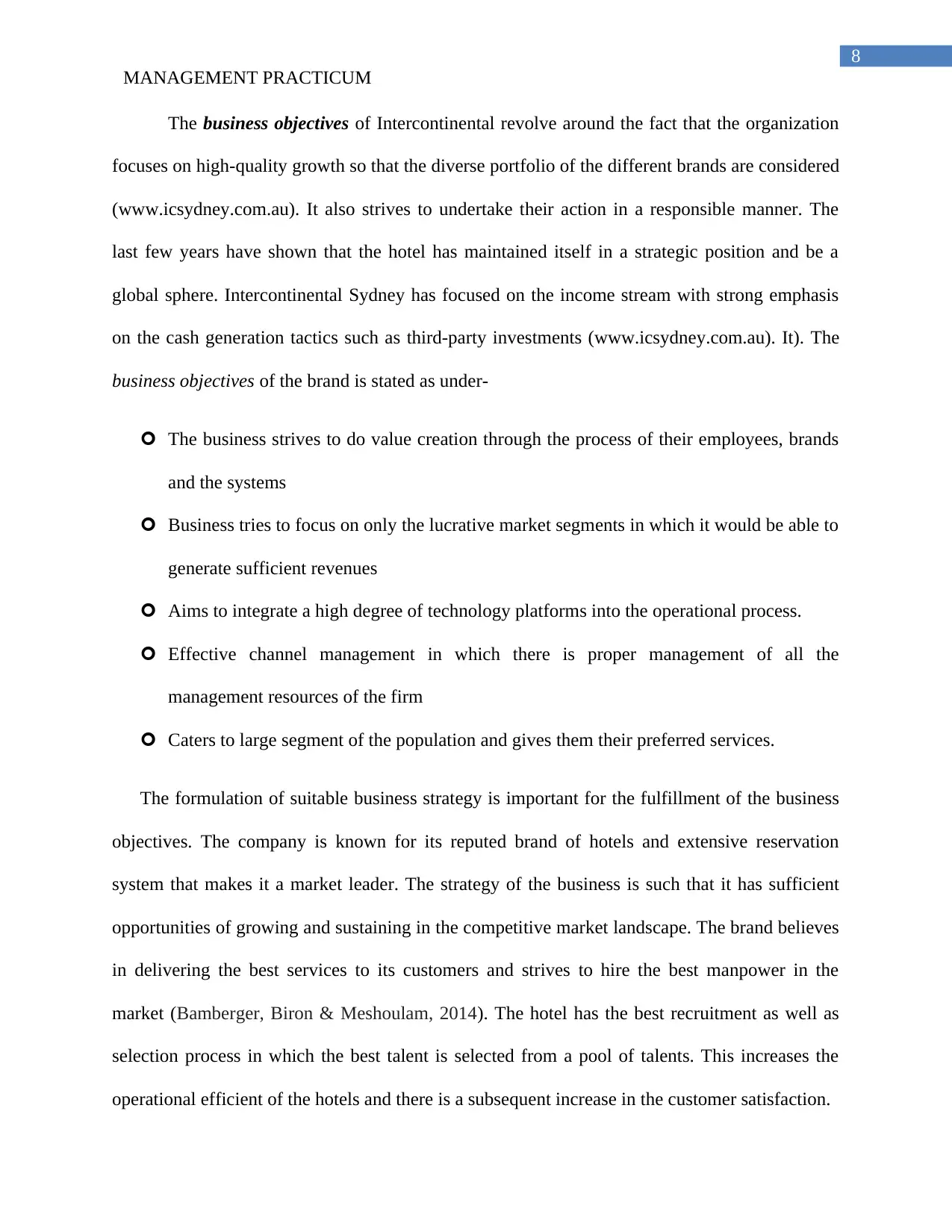
8
MANAGEMENT PRACTICUM
The business objectives of Intercontinental revolve around the fact that the organization
focuses on high-quality growth so that the diverse portfolio of the different brands are considered
(www.icsydney.com.au). It also strives to undertake their action in a responsible manner. The
last few years have shown that the hotel has maintained itself in a strategic position and be a
global sphere. Intercontinental Sydney has focused on the income stream with strong emphasis
on the cash generation tactics such as third-party investments (www.icsydney.com.au). It). The
business objectives of the brand is stated as under-
The business strives to do value creation through the process of their employees, brands
and the systems
Business tries to focus on only the lucrative market segments in which it would be able to
generate sufficient revenues
Aims to integrate a high degree of technology platforms into the operational process.
Effective channel management in which there is proper management of all the
management resources of the firm
Caters to large segment of the population and gives them their preferred services.
The formulation of suitable business strategy is important for the fulfillment of the business
objectives. The company is known for its reputed brand of hotels and extensive reservation
system that makes it a market leader. The strategy of the business is such that it has sufficient
opportunities of growing and sustaining in the competitive market landscape. The brand believes
in delivering the best services to its customers and strives to hire the best manpower in the
market (Bamberger, Biron & Meshoulam, 2014). The hotel has the best recruitment as well as
selection process in which the best talent is selected from a pool of talents. This increases the
operational efficient of the hotels and there is a subsequent increase in the customer satisfaction.
MANAGEMENT PRACTICUM
The business objectives of Intercontinental revolve around the fact that the organization
focuses on high-quality growth so that the diverse portfolio of the different brands are considered
(www.icsydney.com.au). It also strives to undertake their action in a responsible manner. The
last few years have shown that the hotel has maintained itself in a strategic position and be a
global sphere. Intercontinental Sydney has focused on the income stream with strong emphasis
on the cash generation tactics such as third-party investments (www.icsydney.com.au). It). The
business objectives of the brand is stated as under-
The business strives to do value creation through the process of their employees, brands
and the systems
Business tries to focus on only the lucrative market segments in which it would be able to
generate sufficient revenues
Aims to integrate a high degree of technology platforms into the operational process.
Effective channel management in which there is proper management of all the
management resources of the firm
Caters to large segment of the population and gives them their preferred services.
The formulation of suitable business strategy is important for the fulfillment of the business
objectives. The company is known for its reputed brand of hotels and extensive reservation
system that makes it a market leader. The strategy of the business is such that it has sufficient
opportunities of growing and sustaining in the competitive market landscape. The brand believes
in delivering the best services to its customers and strives to hire the best manpower in the
market (Bamberger, Biron & Meshoulam, 2014). The hotel has the best recruitment as well as
selection process in which the best talent is selected from a pool of talents. This increases the
operational efficient of the hotels and there is a subsequent increase in the customer satisfaction.
⊘ This is a preview!⊘
Do you want full access?
Subscribe today to unlock all pages.

Trusted by 1+ million students worldwide
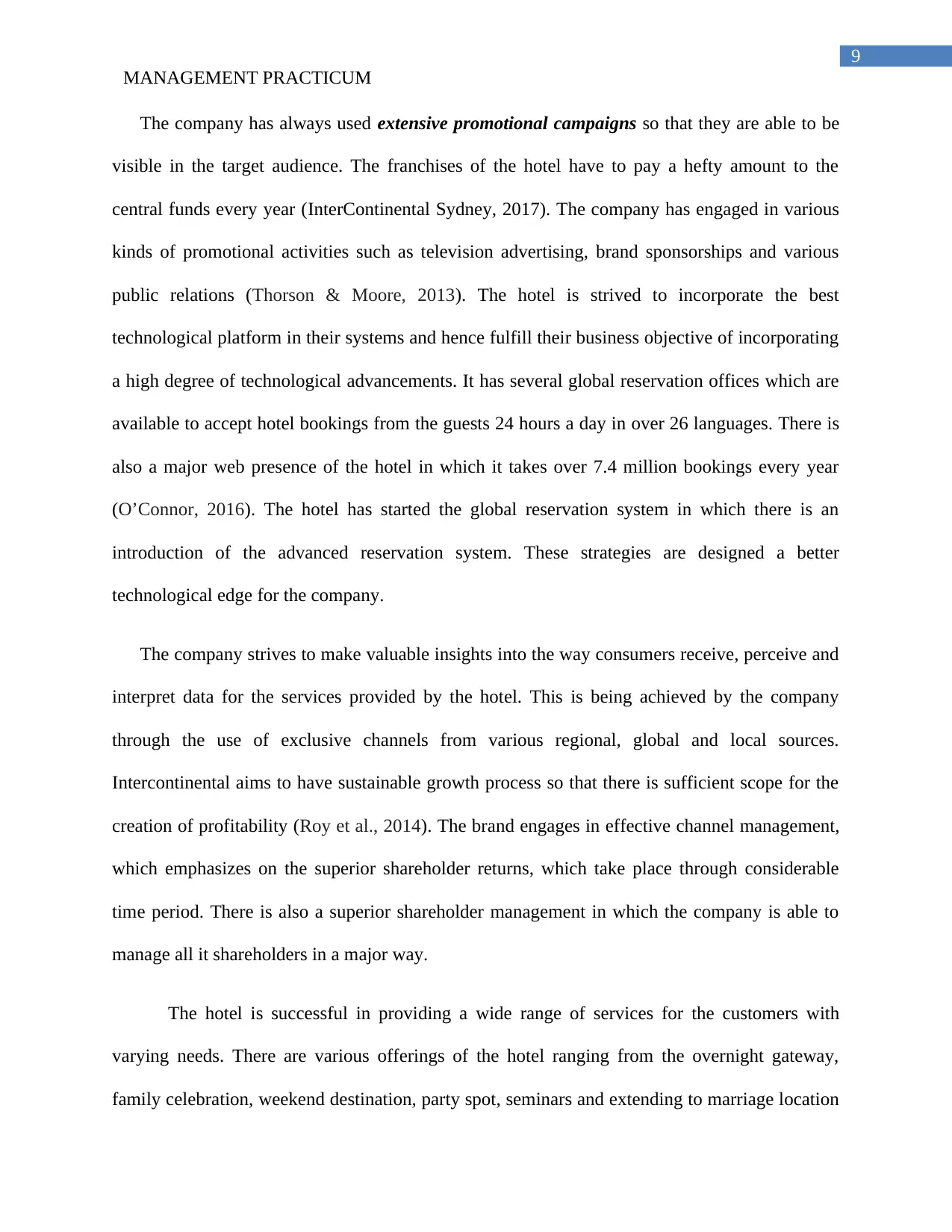
9
MANAGEMENT PRACTICUM
The company has always used extensive promotional campaigns so that they are able to be
visible in the target audience. The franchises of the hotel have to pay a hefty amount to the
central funds every year (InterContinental Sydney, 2017). The company has engaged in various
kinds of promotional activities such as television advertising, brand sponsorships and various
public relations (Thorson & Moore, 2013). The hotel is strived to incorporate the best
technological platform in their systems and hence fulfill their business objective of incorporating
a high degree of technological advancements. It has several global reservation offices which are
available to accept hotel bookings from the guests 24 hours a day in over 26 languages. There is
also a major web presence of the hotel in which it takes over 7.4 million bookings every year
(O’Connor, 2016). The hotel has started the global reservation system in which there is an
introduction of the advanced reservation system. These strategies are designed a better
technological edge for the company.
The company strives to make valuable insights into the way consumers receive, perceive and
interpret data for the services provided by the hotel. This is being achieved by the company
through the use of exclusive channels from various regional, global and local sources.
Intercontinental aims to have sustainable growth process so that there is sufficient scope for the
creation of profitability (Roy et al., 2014). The brand engages in effective channel management,
which emphasizes on the superior shareholder returns, which take place through considerable
time period. There is also a superior shareholder management in which the company is able to
manage all it shareholders in a major way.
The hotel is successful in providing a wide range of services for the customers with
varying needs. There are various offerings of the hotel ranging from the overnight gateway,
family celebration, weekend destination, party spot, seminars and extending to marriage location
MANAGEMENT PRACTICUM
The company has always used extensive promotional campaigns so that they are able to be
visible in the target audience. The franchises of the hotel have to pay a hefty amount to the
central funds every year (InterContinental Sydney, 2017). The company has engaged in various
kinds of promotional activities such as television advertising, brand sponsorships and various
public relations (Thorson & Moore, 2013). The hotel is strived to incorporate the best
technological platform in their systems and hence fulfill their business objective of incorporating
a high degree of technological advancements. It has several global reservation offices which are
available to accept hotel bookings from the guests 24 hours a day in over 26 languages. There is
also a major web presence of the hotel in which it takes over 7.4 million bookings every year
(O’Connor, 2016). The hotel has started the global reservation system in which there is an
introduction of the advanced reservation system. These strategies are designed a better
technological edge for the company.
The company strives to make valuable insights into the way consumers receive, perceive and
interpret data for the services provided by the hotel. This is being achieved by the company
through the use of exclusive channels from various regional, global and local sources.
Intercontinental aims to have sustainable growth process so that there is sufficient scope for the
creation of profitability (Roy et al., 2014). The brand engages in effective channel management,
which emphasizes on the superior shareholder returns, which take place through considerable
time period. There is also a superior shareholder management in which the company is able to
manage all it shareholders in a major way.
The hotel is successful in providing a wide range of services for the customers with
varying needs. There are various offerings of the hotel ranging from the overnight gateway,
family celebration, weekend destination, party spot, seminars and extending to marriage location
Paraphrase This Document
Need a fresh take? Get an instant paraphrase of this document with our AI Paraphraser
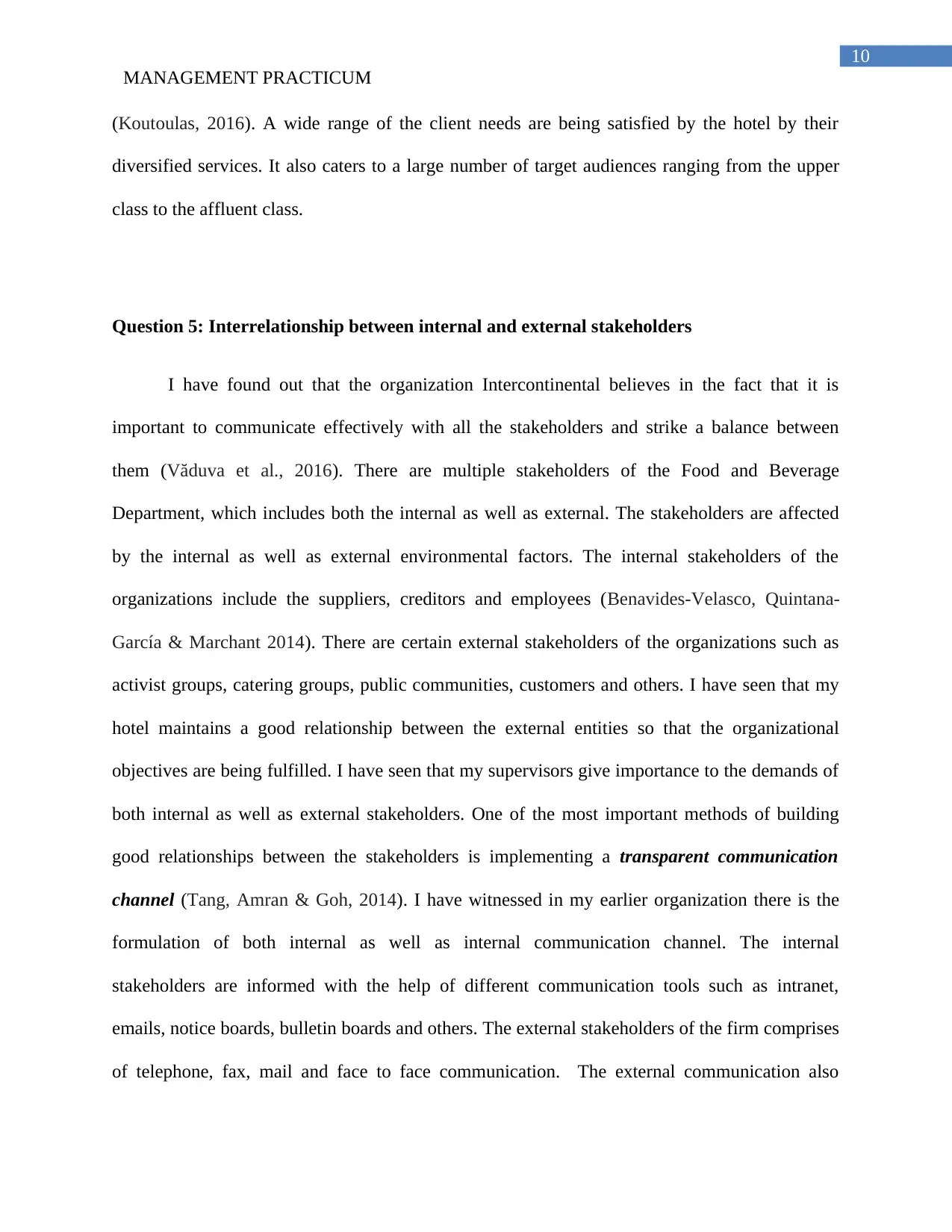
10
MANAGEMENT PRACTICUM
(Koutoulas, 2016). A wide range of the client needs are being satisfied by the hotel by their
diversified services. It also caters to a large number of target audiences ranging from the upper
class to the affluent class.
Question 5: Interrelationship between internal and external stakeholders
I have found out that the organization Intercontinental believes in the fact that it is
important to communicate effectively with all the stakeholders and strike a balance between
them (Văduva et al., 2016). There are multiple stakeholders of the Food and Beverage
Department, which includes both the internal as well as external. The stakeholders are affected
by the internal as well as external environmental factors. The internal stakeholders of the
organizations include the suppliers, creditors and employees (Benavides-Velasco, Quintana-
García & Marchant 2014). There are certain external stakeholders of the organizations such as
activist groups, catering groups, public communities, customers and others. I have seen that my
hotel maintains a good relationship between the external entities so that the organizational
objectives are being fulfilled. I have seen that my supervisors give importance to the demands of
both internal as well as external stakeholders. One of the most important methods of building
good relationships between the stakeholders is implementing a transparent communication
channel (Tang, Amran & Goh, 2014). I have witnessed in my earlier organization there is the
formulation of both internal as well as internal communication channel. The internal
stakeholders are informed with the help of different communication tools such as intranet,
emails, notice boards, bulletin boards and others. The external stakeholders of the firm comprises
of telephone, fax, mail and face to face communication. The external communication also
MANAGEMENT PRACTICUM
(Koutoulas, 2016). A wide range of the client needs are being satisfied by the hotel by their
diversified services. It also caters to a large number of target audiences ranging from the upper
class to the affluent class.
Question 5: Interrelationship between internal and external stakeholders
I have found out that the organization Intercontinental believes in the fact that it is
important to communicate effectively with all the stakeholders and strike a balance between
them (Văduva et al., 2016). There are multiple stakeholders of the Food and Beverage
Department, which includes both the internal as well as external. The stakeholders are affected
by the internal as well as external environmental factors. The internal stakeholders of the
organizations include the suppliers, creditors and employees (Benavides-Velasco, Quintana-
García & Marchant 2014). There are certain external stakeholders of the organizations such as
activist groups, catering groups, public communities, customers and others. I have seen that my
hotel maintains a good relationship between the external entities so that the organizational
objectives are being fulfilled. I have seen that my supervisors give importance to the demands of
both internal as well as external stakeholders. One of the most important methods of building
good relationships between the stakeholders is implementing a transparent communication
channel (Tang, Amran & Goh, 2014). I have witnessed in my earlier organization there is the
formulation of both internal as well as internal communication channel. The internal
stakeholders are informed with the help of different communication tools such as intranet,
emails, notice boards, bulletin boards and others. The external stakeholders of the firm comprises
of telephone, fax, mail and face to face communication. The external communication also
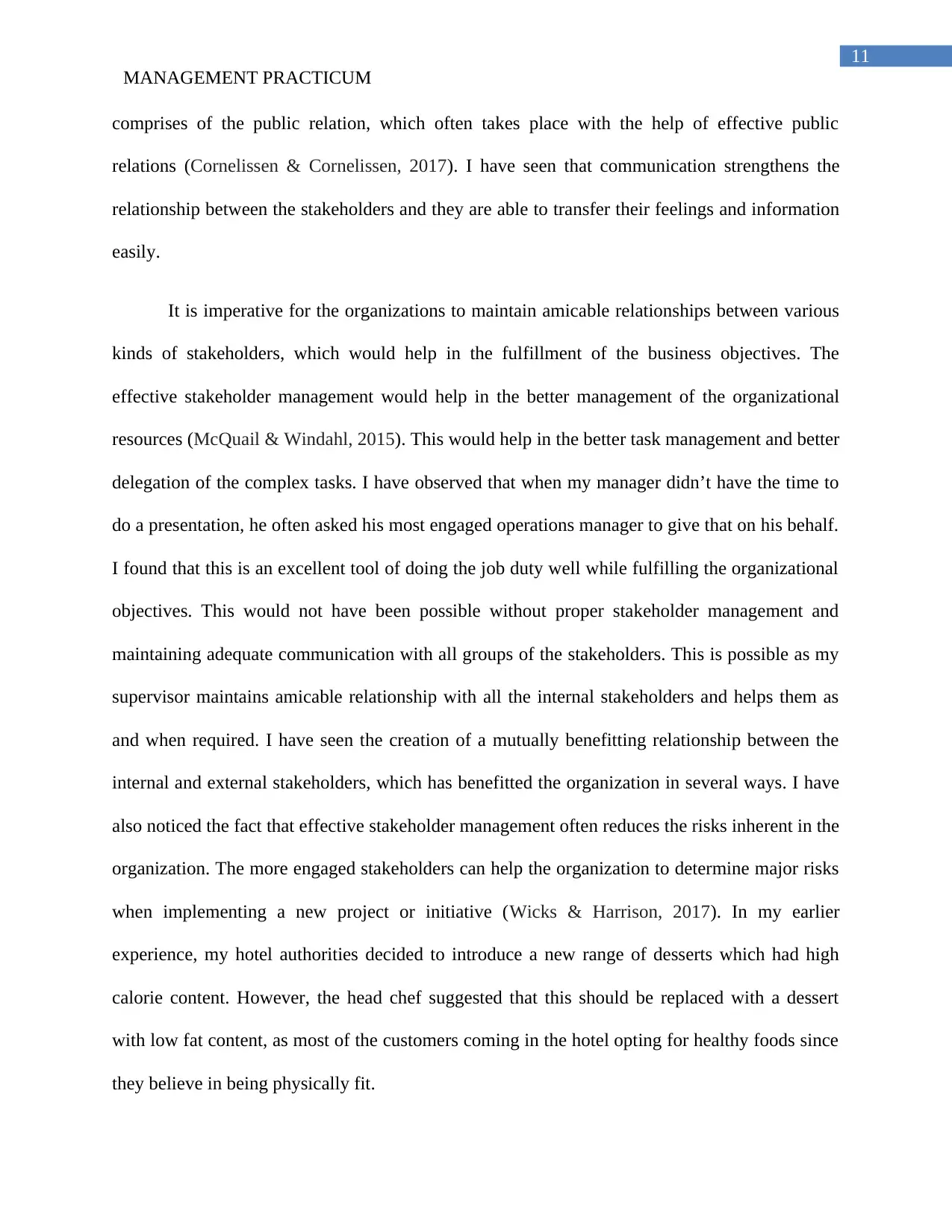
11
MANAGEMENT PRACTICUM
comprises of the public relation, which often takes place with the help of effective public
relations (Cornelissen & Cornelissen, 2017). I have seen that communication strengthens the
relationship between the stakeholders and they are able to transfer their feelings and information
easily.
It is imperative for the organizations to maintain amicable relationships between various
kinds of stakeholders, which would help in the fulfillment of the business objectives. The
effective stakeholder management would help in the better management of the organizational
resources (McQuail & Windahl, 2015). This would help in the better task management and better
delegation of the complex tasks. I have observed that when my manager didn’t have the time to
do a presentation, he often asked his most engaged operations manager to give that on his behalf.
I found that this is an excellent tool of doing the job duty well while fulfilling the organizational
objectives. This would not have been possible without proper stakeholder management and
maintaining adequate communication with all groups of the stakeholders. This is possible as my
supervisor maintains amicable relationship with all the internal stakeholders and helps them as
and when required. I have seen the creation of a mutually benefitting relationship between the
internal and external stakeholders, which has benefitted the organization in several ways. I have
also noticed the fact that effective stakeholder management often reduces the risks inherent in the
organization. The more engaged stakeholders can help the organization to determine major risks
when implementing a new project or initiative (Wicks & Harrison, 2017). In my earlier
experience, my hotel authorities decided to introduce a new range of desserts which had high
calorie content. However, the head chef suggested that this should be replaced with a dessert
with low fat content, as most of the customers coming in the hotel opting for healthy foods since
they believe in being physically fit.
MANAGEMENT PRACTICUM
comprises of the public relation, which often takes place with the help of effective public
relations (Cornelissen & Cornelissen, 2017). I have seen that communication strengthens the
relationship between the stakeholders and they are able to transfer their feelings and information
easily.
It is imperative for the organizations to maintain amicable relationships between various
kinds of stakeholders, which would help in the fulfillment of the business objectives. The
effective stakeholder management would help in the better management of the organizational
resources (McQuail & Windahl, 2015). This would help in the better task management and better
delegation of the complex tasks. I have observed that when my manager didn’t have the time to
do a presentation, he often asked his most engaged operations manager to give that on his behalf.
I found that this is an excellent tool of doing the job duty well while fulfilling the organizational
objectives. This would not have been possible without proper stakeholder management and
maintaining adequate communication with all groups of the stakeholders. This is possible as my
supervisor maintains amicable relationship with all the internal stakeholders and helps them as
and when required. I have seen the creation of a mutually benefitting relationship between the
internal and external stakeholders, which has benefitted the organization in several ways. I have
also noticed the fact that effective stakeholder management often reduces the risks inherent in the
organization. The more engaged stakeholders can help the organization to determine major risks
when implementing a new project or initiative (Wicks & Harrison, 2017). In my earlier
experience, my hotel authorities decided to introduce a new range of desserts which had high
calorie content. However, the head chef suggested that this should be replaced with a dessert
with low fat content, as most of the customers coming in the hotel opting for healthy foods since
they believe in being physically fit.
⊘ This is a preview!⊘
Do you want full access?
Subscribe today to unlock all pages.

Trusted by 1+ million students worldwide
1 out of 20
Related Documents
Your All-in-One AI-Powered Toolkit for Academic Success.
+13062052269
info@desklib.com
Available 24*7 on WhatsApp / Email
![[object Object]](/_next/static/media/star-bottom.7253800d.svg)
Unlock your academic potential
Copyright © 2020–2026 A2Z Services. All Rights Reserved. Developed and managed by ZUCOL.




